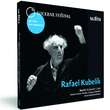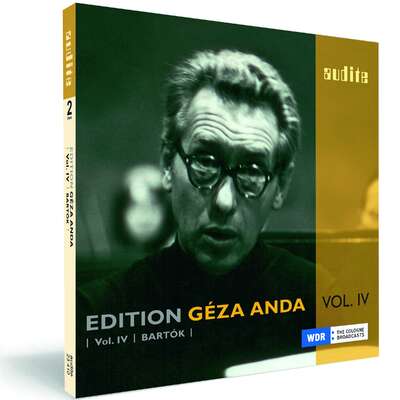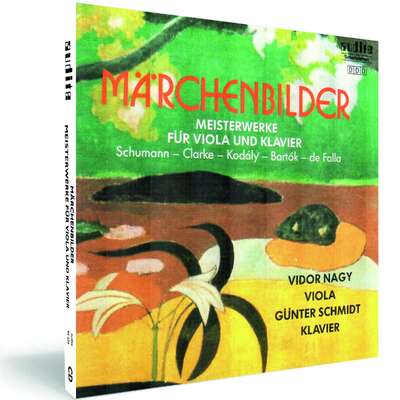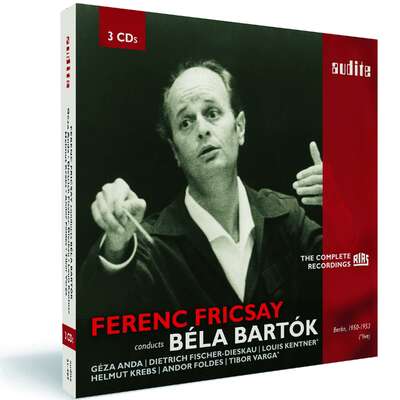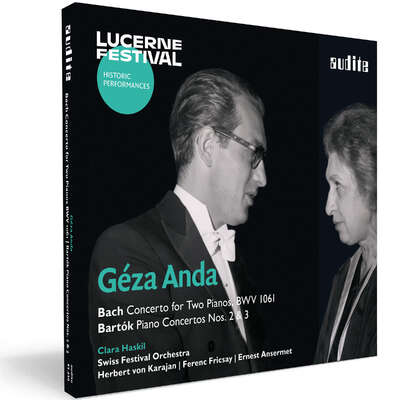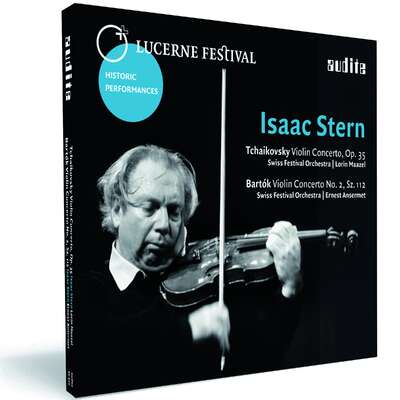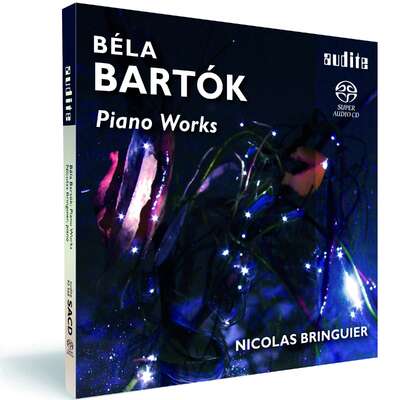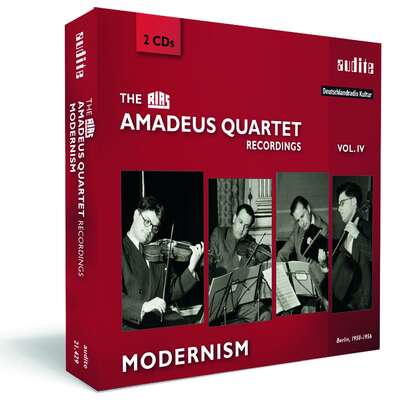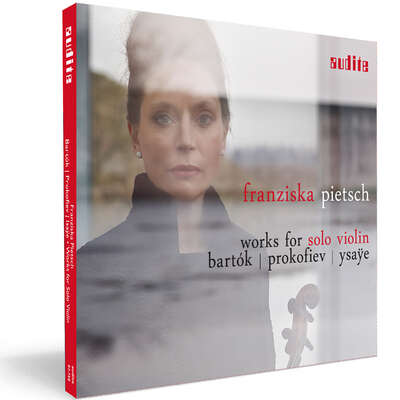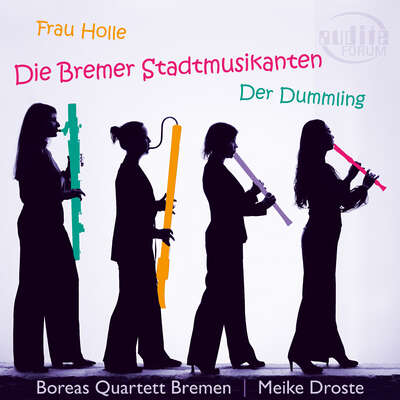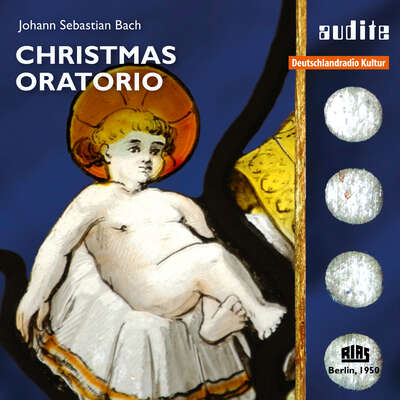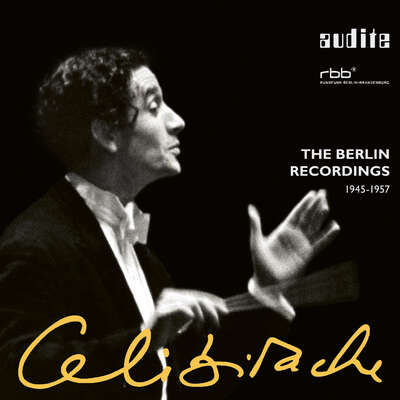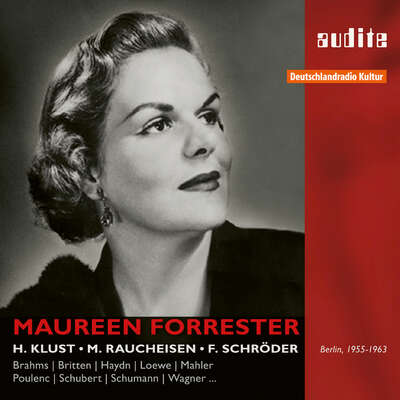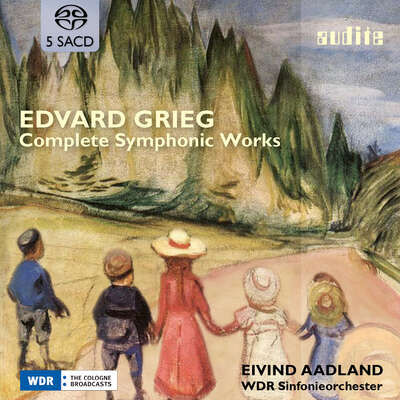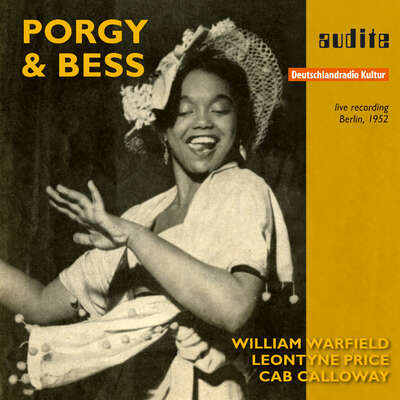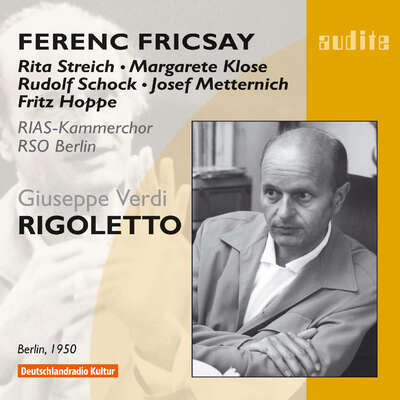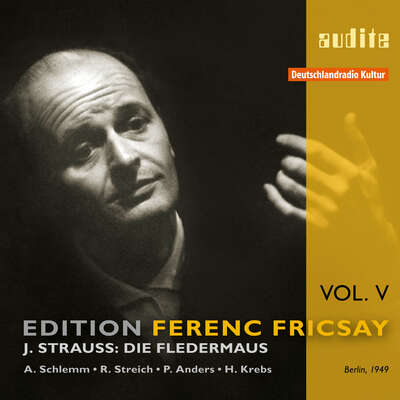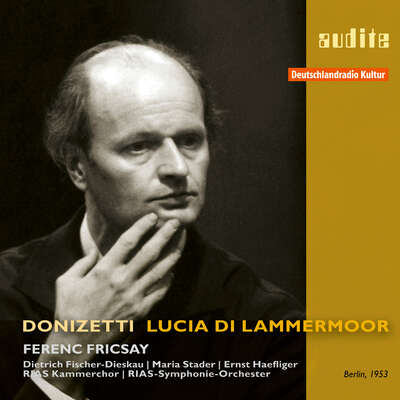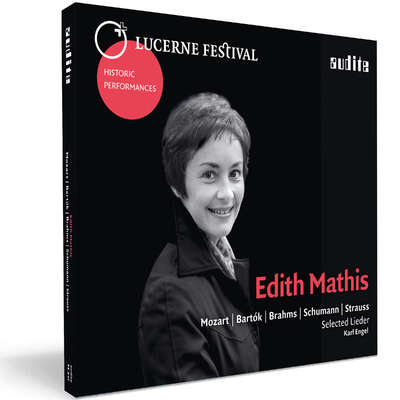
The exiled Czech conductor Rafael Kubelík made Lucerne his second home and, for nearly five decades, was one of the leading figures of the festival. Alongside Irmgard Seefried and Dietrich Fischer-Dieskau he performed Béla Bartók’s only opera, Bluebeard’s Castle, in 1962, revealing with an infallible sense for Bartók’s orchestral riches the emotional abysses of this musical psychological thriller.more
The exiled Czech conductor Rafael Kubelík made Lucerne his second home and, for nearly five decades, was one of the leading figures of the festival. Alongside Irmgard Seefried and Dietrich Fischer-Dieskau he performed Béla Bartók’s only opera, Bluebeard’s Castle, in 1962, revealing with an infallible sense for Bartók’s orchestral riches the emotional abysses of this musical psychological thriller.
Details
|
Rafael Kubelik conducts Bartók: Bluebeard’s Castle
LUCERNE FESTIVAL Historic Performances, Vol. 4 |
|
| article number: | 95.626 |
|---|---|
| EAN barcode: | 4022143956262 |
| price group: | BCB |
| release date: | 16. May 2014 |
| total time: | 60 min. |
Bonus Material
Informationen
On the occasion of Rafael Kubelík's 100th birthday, audite presents this previously unreleased live recording of his memorable concert performance at the 1962 summer festival of Béla Bartók's only opera, Bluebeard's Castle. With an infallible sense for Bartók's orchestral riches and his musical drama of light colours, Kubelík reveals the emotional abysses of this gloomy psychological thriller and moulds the seven chambers symbolising Bluebeard's innermost secrets with expressive psychological gestures. Soloists Irmgard Seefried and Dietrich Fischer-Dieskau, who also sang the role of Bluebeard in studio recordings with Ferenc Fricsay and Wolfgang Sawallisch, are two further regular guest performers of the festival. They convincingly interpret the inner tragedy of the unviable relationship between Judith and Bluebeard and the estrangement of the sexes. "Lucerne has managed to secure the best, the ideal interpreters for these roles", the Neue Zürcher Zeitung commented. "Both singers admirably and thrillingly sustained the emotional high tension, intensifying it more and more."
Only a few weeks after leaving his homeland in 1948 following the communist coup in Czechoslovakia, Rafael Kubelík appeared for the first time at the Internationale Musikfestwochen Luzern, today's LUCERNE FESTIVAL - and found a second home in this city. For nearly five decades Kubelík was one of the leading artists of the festival, as conductor and composer, giving conducting masterclasses and acting as artistic consultant. In 1967 he took Swiss citizenship and in 1968 he moved from Lucerne to nearby Kastanienbaum where he lived until his death in 1996.
In cooperation with audite, LUCERNE FESTIVAL presents outstanding concert recordings of artists who have shaped the festival throughout its history. The aim of this CD edition is to rediscover treasures - most of which have not been released previously - from the first six decades of the festival, which was founded in 1938 with a special gala concert conducted by Arturo Toscanini. These recordings have been made available by the archives of SRF Swiss Radio and Television, which has broadcast the Lucerne concerts from the outset. Carefully re-mastered and supplemented with photos and materials from the LUCERNE FESTIVAL archive, they represent a sonic history of the festival.
This release is furnished with a "producer's comment" by producer Ludger Böckenhoff.
Reviews
Fanfare | February 2019 | Huntley Dent | February 1, 2019
The ongoing series of historical recordings from the Lucerne Festival has been unusually well selected by Audite. The label’s access to originalMehr lesen
Markevitch and Milstein manage to make the Mendelssohn Violin Concerto an event, no easy thing. Straightforward and no-nonsense aren’t terms of praise from me, which is why Milstein, who often displayed both qualities, hasn’t been a favorite over the years. It was a surprise, then, to hear how much inflection he brings to the Mendelssohn, combining freshness with authority. The soloist is placed far forward but not so much so that the orchestra becomes sonic wallpaper. The mono sound is good enough to bring out the color in Milstein’s tone. I like old-fashioned readings of this concerto, which places Isaac Stern’s live account with Leonard Bernstein and the Israel Philharmonic (Sony) high on my list for its warmth and big heart. (The performance appears on an album titled Isaac Stern: Keeping the Doors Open, released to commemorate his successful efforts in the 1960s to keep Carnegie Hall from being demolished.) Milstein-Markevitch are just as impressive.
My mental stereotype was shattered completely in the Dvořák Violin Concerto, where Milstein gives the utmost in expression, feeling, and intensity. It’s remarkable that Ernest Ansermet, not known for Romantic warmth and by no means famous for his Dvořák, should play an equal role. But together they deliver a reading so full of energy and conviction that I haven’t heard its like before. The finale, which can sound squeaky and insubstantial, comes to life with earthy robustness here. Played as if it is a masterpiece, the Dvořák Violin Concerto becomes one. The recorded sound is essentially the same from 1955 as two years previously, but Milstein is placed farther back and, perhaps from deterioration in the tapes, his tone becomes a little gritty. The ear quickly adjusts, however, and the rest is pure pleasure.
As nice as it is to be surprised by two excellent performances that haven’t been released before, even better was to have Milstein rise in my esteem. By all means this CD deserves serious consideration from general listeners and collectors alike.
Fono Forum | Juni 2018 | Christoph Vratz | June 1, 2018
Unerlöst durch Tür sieben
Zwischen Selbstaufgabe aus Liebe und Blick in den Abgrund – Bela Bartoks einzige Oper ist ein musikalischer Psycho-Thriller. Und hundert Jahre nach der Uraufführung längst ein Klassiker. Einige Aufnahmen im Vergleich.
[…] Dietrich Fischer-Dieskau hat den Blaubart noch zwei weitere Male festgehalten: 1962 bei einem Festival-Auftritt in Luzern mit Irmgard SeefriedMehr lesen
Revue Musicale
| 68e année, N° 1 Mars 2015 | M. Tètaz | March 1, 2015
Archives du Lucerne
Festival Hommage à Abbado et Kubelik
La prestation des deux solistes n'en est pas moins remarquable: Dietrich Fischer-Dieskau campe un Barbe-Bleue autoritaire et désespéré, Irmgard Seefried, soprano dans un rôle généralement tenu par un mezzo-soprano, donne à Judith une fragilité et une naïveté angoissée infiniment touchantes. Quant à Kubelik, dont un critique de l'époque disait: «il voulait rendre palpables, avec tous les sens, les tréfonds d'une partition», il met en évidence la partie orchestrale, somptueuse, démoniaque, visionnaire, avec une éloquence et une tension saisissantes.Mehr lesen
Miami Clásica | 16/12/2014 | Sebastian Spreng | December 16, 2014 Los 14 imperdibles del 2014
Un año de optimos registros que hizo dificil la eleccion y que convirtio aMehr lesen
www.concertonet.com | 12/15/2014 | OB | December 15, 2014 Le Château de Barbe-Bleue en allemand à Lucerne
Quatrième volume de la collection «Lucerne Festival Historic Performances» d’Audite, ce Château de Barbe-Bleue de Bartók inédit n’est pas un des grands classiques de la discographie. Pourtant, grâce à ses interprètes, Dietrich Fischer-Dieskau et Irmgard Seefried [...]Mehr lesen
www.arkivmusic.com | 26.11.2014 | Robert Levine | November 26, 2014
[...] it’s a fascinating take on a masterpiece.Mehr lesen
klassik.com | 23.11.2014 | Benjamin Künzel | November 23, 2014 | source: http://magazin.k... Spontanes Musikdrama
[...] sowohl beide Solisten als auch der Dirigent Kubelík werfen sich mit einer wohl dosierten Mischung aus Emotion, Theatralik und der latenten Distanz einer konzertanten Aufführung ins Zeug, dass ein zwingendes Drama für die Ohren entsteht.Mehr lesen
Musica | N° 261 - Novembre 2014 | Roberto Brusotti | November 1, 2014
Dagli archivi della Radio Svizzera (SRF) proviene un’edizione in tedescoMehr lesen
Scherzo | Noviembre 2014 | Enrique Pérez Adrián | November 1, 2014 Otra Diana de Kubelik
Pero el concierto no perdió nada a pesar del inmenso bartokiano que era Fricsay, ya que el impulso emocional de Kubelik, su intensidad, perfecta realización, colorido orquestal, emoción, atmósfera angustiosa y pesante y una intensidad que en muchos momentos recordaba a Furtwängler, logró una recreación que con pocas dudas podemos situar en una de las cimas más altas entre las veintitantas versiones que hoy se pueden encontrar en la discografía. Mehr lesen
Diapason | N° 629 Novembre 2014 | Patrick Szersnovicz | November 1, 2014
15 août 1962 au Festival de Lucerne. Interprète inspiré de Bartok (cf. ses gravures inoubliables de la Musique pour cordes et du Concerto pourMehr lesen
Le choix d'un soprano mozartien peut étonner. Irmgard Seefried incarne en effet une Judith atypique, jeune, fragile, frémissante, à l'étonnement enfantin dans les plus angoissants paroxysmes. Dietrich Fischer-Dieskau, qui a enregistré «officiellement» le rôle avec Fricsay (en allemand) et Sawallisch (dans la lan gue originale), n'a pas la rudesse et la simplicité presque inquiétante de ses meilleurs rivaux. Il campe malgré cela un admirable Barbe-Bleue, d'abord menaçant, puis de plus en plus désespéré – il sera plus tendre et fragile dixsept ans plus tard avec Sawallisch. Il semblera aux oreilles de certains «wagnériser» le rôle, alors même que la concentration psychologique et la densité intellectuelle de son interprétation sont hors pair.
Der Tagesspiegel | 21. September 2014 | September 21, 2014 Tagesspiegel-Kritikerinnen und -Kritiker empfehlen: Die besten CDs im Herbst
Die brennende Intensität der Aufführung [...] begeisterte schon damals das Publikum.Mehr lesen
International Record Review | September 2014 | Nigel Simeone | September 1, 2014
It should be obvious from the list of selected comparisons that Bluebeard's Castle is a work that has done extremely well on record: the classicMehr lesen
So where does this newcomer – in fact more than half a century old – fit into the scheme of things? Recorded live at the Lucerne Festival in 1962, it's sung in German, which may put some people off, but honestly doesn't worry me when the singing has such conviction. Second, it has the benefit of Rafael Kubelik's conducting. Devotees of this piece may know his live recording made in 1981 with the New York Philharmonic with Tatiana Troyanos and Sigmund Nimsgern (it was included in a box of broadcast performances issued by the orchestra). He's a wonderful conductor of this work: never overdoing the drama, but underlining the turning points with the utmost sensitivity and an acute ear for telling details – and his sense of dramatic timing and pacing is unerring.
Then there's the singing: Dietrich Fischer-Dieskau is on magnificent form, bringing a kind of world-weary resignation to Bluebeard's ever more chilling revelations, and doing so in resonant voice. There's no barking or hectoring, but some very clear diction and complete involvement in the role. lrmgard Seefried is rather an unexpected choice of Judith. A stunning Mozart and Strauss singer, she’s not always comfortable in this role – and, be warned, her top C is a sort of strangled shriek. And yet, the sense that she is in a situation from which there can be no escape is tangible, and terrifying. Her singing near the end has devastating poignancy. Incidentally, the spoken prologue is omitted.
The Swiss Festival Orchestra plays admirably and the broadcast sound is acceptable – it has been very carefully restored by audite for this release. The notes include an interesting essay on the performance, but the absence of a libretto is to be regretted. What matters more than the language or the slightly boxy sound is the tangible intensity of this Bluebeard's Castle, and that makes it a version that really has to be heard.
Gramophone | September 2014 | September 1, 2014 Gripping Bluebeard
Bartók's Duke Bluebeard's Castle is in essence about the inscrutability of an older man and the burning curiosity of a younger woman, an opera that'sMehr lesen
Dietrich Fischer-Dieskau twice recorded Bluebeard commercially, but in concert any sense of propriety is thrown to the winds and he sounds (and sings) the part as never before on disc, commanding, compassionate, occasionally impatient and with a macho swagger to the voice that suits the role to a T. Irmgard Seefried on the other hand is the most girlish, innocent-sounding Judith I've ever heard, the opposite of, say, Jessye Norman (the most regal Judith on disc), impressionable rather than vulnerable, though when Bluebeard flings open the door to his vast kingdom she intones a rather shortbreathed top C. Kubelik is magnificent, cueing his Swiss Festival Orchestra players to etch each scene with bold primary colours, even the mournful lake of tears. The climaxes are overwhelming (especially Judith's internment), even though heard through rather over-resonant sound. Not perfect by any means (and there are no ghostly voices) but wonderful!
www.pizzicato.lu | 01/09/2014 | Remy Franck | September 1, 2014 Fantastisches Bartok-Dokument mit Kubelik, Seefried und Fischer-Dieskau
Bela Bartoks einaktige Oper ‘Herzog Blaubarts Burg’ gehört im 20. Jahrhundert zu den großen Werken dieser Gattung. Wenn auch wenigMehr lesen
Kubelik erweist sich als genialer Interpret, der es nicht scheut, in die bedrohlichen Abgründe dieser Musik hinabzusteigen. Hoffnung oder gar Licht lässt er in keinem Moment aufkommen.
Der Kunstgriff dieser Aufführung bestand allerdings darin, für die Judith nicht auf eine Altstimme oder einen Mezzosopran zu setzen, sondern auf den leichten und jugendlich-anmutigen Sopran von Irmgard Seefried, die für mich die schönste und authentischste Judith der Plattengeschichte singt. Fischer-Dieskau ist ein nobler, aber sehr düsterer Blaubart und wie für diese Partie geschaffen. Die Dialoge zwischen Seefried und Fischer-Dieskau sind faszinierend, und man kann den Bariton nur dafür bewundern, mit welch sparsamen Mitteln er die ganze Hin- und Hergerissenheit dieser Figur zu gestalten versteht. Hätte man damals ein besseres Orchester und eine bessere Aufnahmequalität zur Verfügung gehabt, so wäre dies die vielleicht beste Blaubart-Aufnahme der Diskographie geworden. Trotzdem, wegen Kubeliks Interpretation und der Sänger ist sie absolut empfehlenswert.
Kubelik’s very dark version could have been the best available if only the orchestra and the sound quality would match the high artistic qualities of the conductor and the excellent singers. Nevertheless, this recording is a top notch recommendation.
American Record Guide | September 2014 | Ralph V Lucano | September 1, 2014
Fischer-Dieskau seemed to like the role of Bluebeard. He made two studio recordings of it for DG, one in German (with Hertha Töpper) conducted byMehr lesen
She can, perhaps, seem too outgoing a singer, but next to Fischer-Dieskau she’s a model of restraint. His role does not lie in a comfortable part of his voice. In particular, it needs a depth and resonance he doesn’t have—his first few lines already take him below the point where he can produce singing tone. After the fifth door opens, you want his voice to expand confidently, but instead he tends to bark and shout rather than muster the needed fullness. He’s interesting to listen to, and when he doesn’t have to strain for volume, he can be direct and communicative, but he’s still wrong.
Kubelik draws spirited playing out of the Swiss Festival Orchestra, and the monaural sound is good—deep and undistorted; all the drama and color in the score come across.
No texts are supplied. As usual nowadays, Audite directs you to their website; but the German libretto given does not match the words we actually hear, though it’s close enough to follow. Worth having for Seefried’s sake. If you insist on a Fischer-Dieskau Bluebeard, go with the Hungarian one.
www.ClassicsToday.com | 04.08.2014 | Robert Levine | August 4, 2014 Kubelik’s Fascinating Take On “Bluebeard”
This previously unreleased performance, recorded live at the 1962 LucerneMehr lesen
El Nuevo Herald | Publicado el sábado, 08.02.14 | Sebastian Spreng | August 2, 2014 Un ‘Barba Azul’ histórico para atesorar
La combinación de ambos, fuego y hielo, cerebro y corazón, sencillamente ideal, unida a la sabiduría de Kubelík que completa este triángulo musical para la historia, y además muy bien grabado para la época. Aquí no hay excesos sino una atmósfera asfixiante que en vez de estallar se apaga en un descenso mágico y espeluznante hacia las tinieblas para hundirse en el mar de lágrimas. Un merecido homenaje a su centenario y un esencial que lo ubica junto a los infaltables registros de Fricsay, Pierre Boulez, Istvan Kertesz y el reciente de Ivan Fischer.Mehr lesen
La Liberté | Samedi 2 août 2014 | BI | August 2, 2014 Kubelik Historique Classique
[...] dans le rôletitre, un extraordinaire Dietrich Fischer-Dieskau instaure un climat fataliste, sombre et secret à souhait. A la réplique, Irmgard Seefried campe l’innocente Judith, dont la voix traduit l’épouvante sans tomber dans le mélodrame. Et Kubelik est là pour ériger autour des solistes une forteresse sonore.Mehr lesen
Miami Clásica | 15/07/2014 | Sebastian Spreng | July 15, 2014 Un Barba-Azul histórico para atesorar
La combinación de ambos, fuego y hielo, cerebro y corazón es sencillamente ideal unida a la sabiduría de Kubelík que completa este triángulo musical para la historia, y además muy bien grabado para la época. Aquí no hay excesos sino una atmósfera asfixiante que en vez de estallar se apaga en un descenso mágico y espeluznante hacia las tinieblas para hundirse en el mar de lágrimas. Un merecido homenaje a su centenario y un esencial que lo ubica junto a los infaltables registros de Ferenc Fricsay, Pierre Boulez, Istvan Kertesz y el reciente de Ivan Fischer.Mehr lesen
The Guardian | 11 July 2014 | Tim Ashley | July 11, 2014 Bartók:Bluebeard's castle
the extraordinary pairing of Irmgard Seefried's Judith with Dietrich Fischer-Dieskau's Bluebeard, both totally immersed in their roles, ensures an interpretation like no other. [...] As good as the classic recordings by István Kertész and Iván Fischer, and absolutely unforgettable.Mehr lesen
Neue Zürcher Zeitung | 04. Juli 2014 | Thomas Schacher | July 4, 2014
Konservierte Emotionalität
Béla Bartóks Oper «Herzog Blaubarts Burg» mit Rafael Kubelík
Was [...] deutlich herauskommt, ist die Sorgfalt, mit der Kubelík die schillernden Klangfarben des Orchesters herausarbeitet. [...] Man spürt da auch heute noch die grosse Emotionalität, die Kubelík in seinen Live-Darbietungen immer wieder freisetzen konnte. Dietrich Fischer-Dieskau mimt den Psychopathen Blaubart facettenreich und noch ohne die Manieriertheit seiner späteren Jahre.<br /> Mehr lesen
Das Opernglas | Juli/August 2014 | W. Kutzschbach | July 1, 2014 Herzog Blaubarts Burg
Zum einen ist es der tschechische Dirigent Rafael Kubelik, der das Schweizerische Festspielorchester zu einer vor Emotionalität und Expressivität strotzenden Wiedergabe anspornt. Hier wird nichts geglättet, für ein schönes Klangbild poliert, sondern mit dem Willen zur Klangdramatik jede einzelne Szene blutvoll herausgearbeitet.Mehr lesen
http://operalounge.de
| Juni 2014 | Rüdiger Winter | June 30, 2014
Von Tür zu Tür
Ungarisch und deutsch - Bartóks "Blaubart" bei Signum und Audite
Der Regisseur Ernst Lert, der 1922 die deutsche Erstaufführung des Werkes in Frankfurt betreute, sprach von einem „Drama der abstrakten Ideen“.Mehr lesen
Die Überraschung ist Irmgard Seefried als Judith. Bei der Ankündigung der Neuerscheinung ging ich von einem Irrtum aus. Die Seefried, eine ausgewiesene Mozartsängerin, mit der vornehmlich lyrischen Liedliteratur bestens vertraut, in dieser Partie, die gemeinhin als sehr dramatisch, wenn nicht gar hochdramatisch gilt? Irrtum ausgeschlossen, es ist die Seefried, unverkennbar mit ihrem samtigen Sopran, der stets einen Schuss Naivität hat – und nicht nur, weil ihr Name schwarz auf weiß gedruckt ist. Das Booklet macht schlau. Es berichtet, dass die Seefried vier Jahre nach dem Konzert, also 1966 die Judith auch auf der Bühne der Wiener Volksoper gegeben hat.
Ich gebe es gern zu, immer der Öffnung der fünften Tür entgegen zu fiebern, hinter der sich unter dem lauten Aufschrei der Judith, Blaubarts großes Reich in strahlendem Licht ausbreitet – soweit die Blicke reichen. Orgelklänge türmen sich auf, als wollten sie dem Bild zusätzlich Bedeutung und Feierlichkeit verleihen. Nicht so hier. Kein Schrei, keine Orgel. Judith entfährt das „Ah!“ eher beiläufig. Sie ist so beeindruckt nicht – und es ist ein starker Moment, in dem Blaubart plötzlich keine Macht über sie hat. Mir ist keine Aufnahme bekannt – und es dürfte inzwischen so an die dreißig geben – in der diese Szene, die sich als symptomatisch für die gesamte Aufführung erweist, so zwingend gelingt. Im Verein mit der mitunter fast lakonischen Seefried kann mich Dietrich Fischer-Dieskau als Blaubart mehr überzeugen als in seinen anderen beiden Studio-Aufnahmen. Der Einsatz der Orgel ist in dieser Konzertfassung nicht zwingend, der Verzicht auf den gesprochenen Prolog, von dem es deutsche Übersetzungen gibt, unverständlich. Verfasser ist Bartók selbst. Der Prolog bildet in der Struktur des Werkes den inhaltlichen Einstieg – auch wenn es kein musikalischer ist. Er zieht das Publikum hinein. Erst daraus ergibt sich die starke Wirkung des geheimnisvollen Beginns im Orchester.
Audiophile Audition | June 25, 2014 | Gary Lemco | June 25, 2014
On the occasion of Rafael Kubelík’s 100th birthday, Audite presents this previously unreleased, live recording of his memorable concert performance at a 1962 summer festival of Béla Bartók’s only opera, Bluebeard’s Castle. With a driven sense for Bartók’s orchestral riches and his musical drama in chiaroscuro, Kubelík reveals (15 August 1962) the emotional abysses of this gloomy psychological thriller and moulds the seven chambers symbolizing Bluebeard’s innermost secrets with expressive psychological gestures.Mehr lesen
www.voix-des-arts.com | 25 June 2014 | Joseph Newsome | June 25, 2014
Presented in best-possible sound via Audite’s new remastering by Ludger Böckenhoff, this 1962 concert performance of Bartók’s awe-inspiring score proclaims in every one of its sixty minutes that the opera is a benchmark of polytonalism and Freudian psychological drama. Rafael Kubelík, Dietrich Fischer-Dieskau, and Irmgard Seefried form an unlikely but uncannily potent team who offer a legitimate performance of Bartók’s music rather than a reaction to its reputation. As a document of its conductor’s mastery of a tricky score that has defeated many gifted musicians and an example of the feats of which great singers are capable even in music that overextends their vocal resources, this recording is a treasure: as an absorbing, imperfect but indispensable performance of Bluebeard’s Castle, it is one of the most welcome releases of 2014.Mehr lesen
Musica | numero 257 - giugno 2014 | June 1, 2014
Per omaggiare Rafael Kubelik, a cent’anni dalla nascita, AUDITE propone una registrazione ineditaMehr lesen
Der neue Merker | Mai 2014 | Dr. Ingobert Waltenberger | May 1, 2014 | source: http://der-neue-... Rafael Kubelik dirigiert Bela Bartóks HERZOG BLAUBARTs BURG – Sensationeller Live-Mitschnitt der Internationalen Musikfestwochen Luzern 1962 – mit dem grandiosen Duo Dietrich Fischer-Dieskau und Irmgard Seefried
Da die Masterbänder zur Verfügung standen, ist die CD auch aufnahmetechnisch unmittelbar zupackend. [...] Von den vielen Aufnahmen dieser Oper aus meinem Archiv ist die nunmehr vorliegende die intensivste faszinierendste. Dieskau und Seefried sind in dieser Koppelung unübertroffen.Mehr lesen
